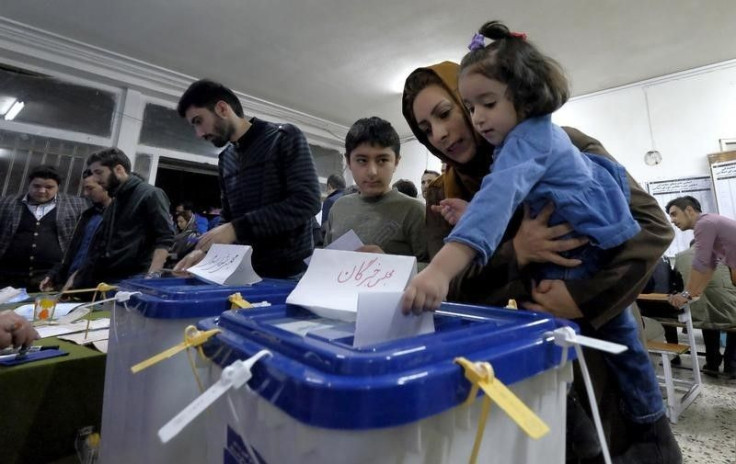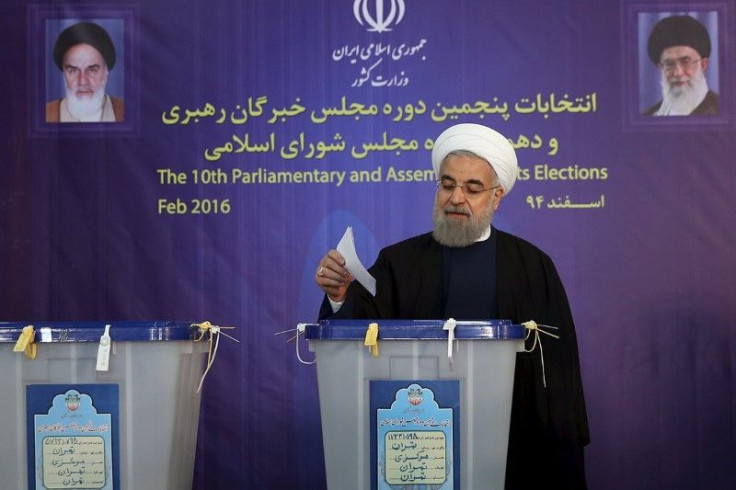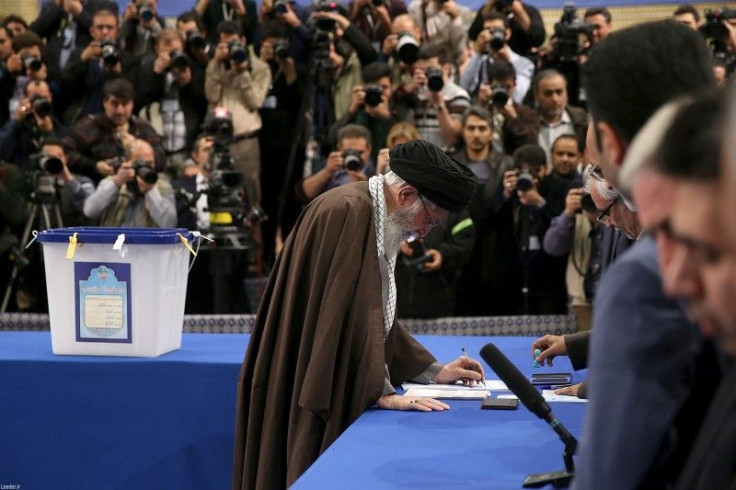Iran's Financial Future A Key Issue At Election Polls For Middle Class In Tehran

BEIRUT — Early returns indicate reformists are ahead of conservatives after the momentous elections in Iran Friday, the first conducted in the country since it signed the historic nuclear deal with the U.S. and other world powers last year.
Polls closed at midnight local time (3:30 p.m. EST), and ballots cast for the 290-seat Parliament and the 88-seat Assembly of Experts, the body responsible for monitoring Supreme Leader Ayatollah Ali Khamenei and selecting his successor, were still being counted Saturday. The mounting support for President Hassan Rouhani, a moderate, is a sign of progress to many who argue the results would constitute the real deciding factor about Iran’s financial future and its place on the international stage.
“Iran is an extremely [diverse] country. [In] Tehran, the moderates will have the upper hand; the rest is not clear,” said Shahin, a sales manager at an airline based in the capital who did not want to give his full name, citing security concerns. “We cannot expect major changes, but at least it will be in the right direction.”
Elected in 2013, Rouhani was responsible for reaching an agreement with the U.S. and five other countries that led Iran to curb its nuclear program in exchange for the lifting of economic sanctions. The deal has allowed the nation, with the world’s fourth-largest oil reserves, to reboot its international trade.

Iran’s economy, the second-largest in the Middle East, and the promise of a better financial future appeared to be the most important factors determining the decisions of voters at the polls in Tehran Friday, Shahin told International Business Times.
“Middle-class people, including myself, are looking for better relations with the world,” Shahin said. “[This] was the motto of moderates as well as reformists.”
Since the nuclear deal was signed last year, more than 120 foreign businesses have visited Iran in hopes of making new investments. In response, Rouhani has visited several European countries seeking to form new economic partnerships for Iran, as BuzzFeed reported.
“The economic situation is more important to people than Rouhani’s travels abroad in informing their election decision or [deciding] whether to vote,” Amir Khaleghiyan, a researcher at the Iranian Institute for Social and Cultural Studies in Tehran, told BuzzFeed.
The importance of the elections this year was reflected in the voter turnout, which was more than 60 percent, according to the Iranian interior ministry. For those who abstained, particularly among the young and liberally minded, even the election of a moderate-majority Parliament would not be seen as enough to bring about internal economic improvements in Iran, where one-quarter of young people are unemployed.
Source: tradingeconomics.com
So far, the biggest beneficiaries of Iran’s new financial freedom under Rouhani’s leadership have been the government and state-run companies, some linked to the Iranian Revolutionary Guard Corps (IRGC).
“The economic situation has not improved despite Rouhani’s promises and the release of sanctions. Iranians know that there will be no change by voting since Rouhani and his faction have been part of this regime from the very beginning and not ‘moderate,’” Mar Yah, a 30-year-old Iranian human rights activist, told IBT.
Yah and other activists are concerned that the cash influx will be used to boost the IRGC and strengthen Tehran’s network of proxies — various militias in Iraq, the Houthis in Yemen, Hezbollah in Lebanon and groups allied with President Bashar Assad’s regime in Syria — instead of desperate Iranian citizens.
“There’s no doubt that it’s going to strengthen those Iranian proxy forces throughout the region,” Russell A. Berman, a senior fellow at the Hoover Institution, a public policy think tank based at Stanford University in California, told IBT in the days following the nuclear deal. “Initially, it will be a source of moral encouragement. Secondly, it will mean [Iranian proxies in the Middle East] will be using their resources in anticipation of greater resources [later].”
For Shahin, “it’s still too early to say” whether Rouhani’s plans will see the lifting of sanctions benefiting Iranian citizens personally. But for Yah, the human rights activist, the fact Rouhani’s supporters may gain seats in Parliament is unlikely to change the status quo because “the election is [among a limited] selection [of candidates] and not free.”

Before getting their names on the ballot, electoral candidates had to obtain the approval of the Guardian Council, an appointed body of 12 Islamic jurists, which “places ultimate temporal and spiritual power in the hands of the supreme leader,” according to Human Rights Watch. The council OK’d only about 40 percent of the 12,126 registered candidates in the elections Friday, Iranian state-run IRIB News reported.
“Participating in the elections [is] to give legitimacy to the [government], therefore [those who are against the regime] in Iran boycott it,” Yah said. “Change can only come with the overthrow of the complete regime.”
© Copyright IBTimes 2024. All rights reserved.






















